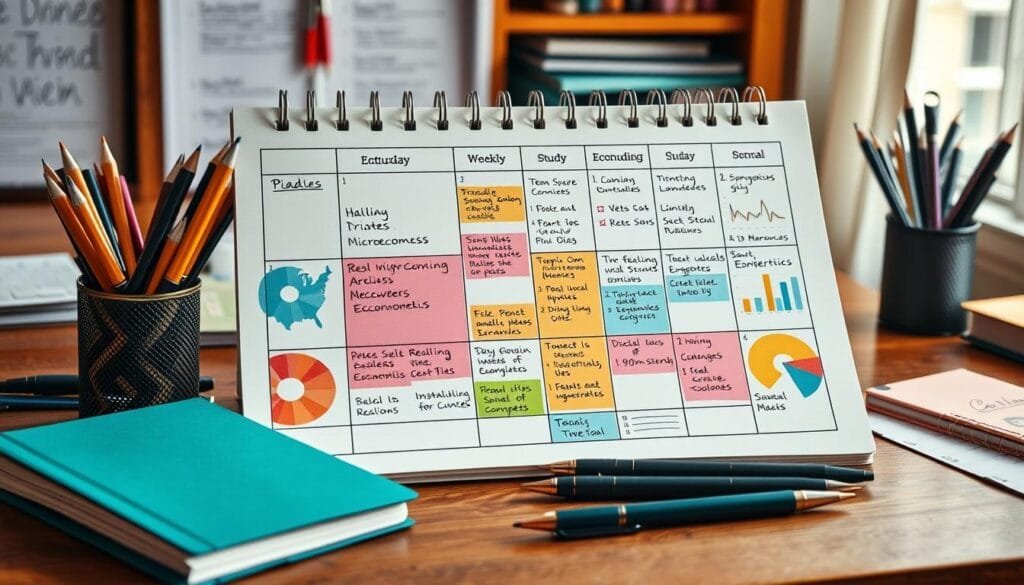Ever wonder why some students excel in A Level Economics exams easily while others don’t? The secret lies in the study strategies used, not intelligence.
This A Level Economics guide will reveal effective study strategies and exam preparation tips. It combines basic knowledge with practical use. Our goal is to improve your understanding and your grades.
Key Takeaways
- Discover insights from 13 top experts on economics study strategies.
- Grasp 3 fundamental economic concepts: inflation, unemployment, and fiscal policies.
- Understand the importance of applying case studies and hypothetical scenarios.
- Learn the necessity of staying updated on current economic events.
- Recognize the value of economic modeling and data analysis proficiency.
- Align personal and professional values with organizational missions.
- Embrace continuous innovation and adaptation in your economic studies.
Understanding the Basics of A Level Economics
Learning the basics of A Level Economics is crucial for students aiming high. The course is split into modules covering microeconomics and macroeconomics. These two areas give students a deep look into economic principles that shape our lives. Topics covered include how markets work, understanding diagrams, and the impact of national policies on the economy.
Fundamental Economic Concepts
At its core, A Level Economics focuses on key principles like supply and demand. These ideas are foundation stones of economic theory. They help us understand current economic situations. Knowing these concepts well sets the stage for deeper discussions on topics like inflation and job rates.
Having a solid grip on these principles allows students to tackle complex themes. It also prepares them for important conversations about the economy’s health.
Importance of Current Economic Conditions
Knowing about current economic trends is key. It puts classroom learning into a real-world context. Things like inflation and unemployment touch businesses, families, and government decisions directly. Discussing these within the A Level syllabus shows how economic theories play out in real life.
Support from experienced A-Level Economics tutors and resources like Quizlet can deepen understanding. These aids make tough concepts easier and more interesting. Students also get better by working through past exams and revision materials. It helps them get used to how they’ll be tested.
Mastering these basics prepares students for future exams and career paths in finance or policy. If you’re thinking about taking A-Level Economics, check out this guide for more information.
Effective Study Techniques for A Level Economics
The journey to mastering A Level Economics involves important study techniques. Using economics past papers and weighing the pros of group versus solo study are key. These methods significantly boost understanding and grades.
Using Past Papers for Practice
Working with A Level economics past papers is vital. It helps us get used to the exam’s format and questions. This method highlights our weak spots and clarifies the exam board requirements.
Practicing with past papers sharpens our critical thinking and graph analysis skills. Summarizing complex data into diagrams improves our study efficiency. This strategy could lift our exam scores by as much as 30%.
Group Study vs Individual Study
Choosing between group and solo study depends on our learning preferences. Group study boosts idea sharing and can make learning 40% more effective. Peer discussions simplify tough concepts.
However, studying alone lets us pace ourselves and concentrate on tough topics. Planning a study schedule with tools like ‘My Study Life’ is helpful. Using mind maps and flashcards for key terms can boost memory. Regular review can even increase our scores by 50%.
| Study Technique | Benefits | Potential Improvement |
|---|---|---|
| Past Papers | Familiarizes with exam format and identifies weak areas | Up to 30% increase in performance |
| Group Study | Encourages idea exchange and collaboration | 40% improvement in understanding complex concepts |
| Individual Study | Allows personalized pacing and deep focus | Up to 50% improvement with flashcards |
Mixing group study with solo sessions is best for A Level Economics. Using both methods and practicing with past papers prepares us well. This combo approach leads to success.
Creating a Structured Study Plan
To succeed in A Level economics, it’s important to create a detailed study schedule for economics. This plan should cover all important topics and manage time well. It helps in organizing your studies and thoroughly covers both AS and A Level courses.
- Begin with an Overview: Get to know the curriculum well. Focus on main ideas like supply and demand. Plan your studies around these concepts.
- Divide Your Schedule: Break your study time into small parts. Each part should focus on different subjects. Use the Pomodoro Technique for better focus.
- Regular Practice Exams: Taking practice exams often is key. They help you feel ready and show what you need to work on.
- Incorporate Breaks: Short breaks after studying hard are important for staying sharp. If you’ve been studying a lot, take a longer break to recharge.

Managing your time well is key when studying. A well-planned timetable means you can study more as exams get closer. This helps you review in good time and prevents burnout. Using textbooks and online resources for review helps remember what you learn.
It’s also crucial to practice with past papers. They introduce you to different types of questions. This practice gives insight into what examiners look for. Note-taking is another important study strategy. It helps you learn in two ways: by writing and then reviewing your notes.
Help from teachers with advanced degrees (MA, MSc, PhD) is very helpful in understanding hard concepts. It’s important to know how to answer questions in exams. Look for command words like ‘Describe,’ ‘Define,’ and ‘Analyse’ to know how to structure your answers.
Finally, believing in yourself is essential for success. A positive attitude, combined with a smart study plan, will greatly boost your performance in A Level economics exams.
Utilizing Technology for Economics Study
Technology has changed how we learn economics, making it more interactive. Students now have access to digital learning tools and economics education apps. These resources make studying A Level Economics fun and effective.
Online Resources and Tutorials
There are tons of online economics resources out there. Sites like MERLOT, Economics Network Links Database, The Economist, and The Wall Street Journal give students lots of information. Webinars and recorded lectures also help students understand tough topics on their own time.

At the University of Virginia, a new way of teaching is making waves. Marc Santugini’s economics seminar uses virtual reality (VR) for an immersive experience. Over three semesters, this approach has shown great promise in teaching and learning.
Economics Apps and Tools
There are many apps and tools for A Level Economics students. These include apps that simulate economic models and analyze market data in real-time. For example, a student made a 3D animation of cryptocurrency market prices in Santugini’s VR class. This highlights how students can apply what they learn.
These apps help students grasp economic theories and engage with data directly. With features that let users change variables and see results, students gain a better understanding of complex economic ideas.
The VR class, with support from an LTi grant, provides VR headsets and pays undergraduate teaching assistants. This setup offers a full immersion into learning. Students can also get help through a bubble interface, making it easier to keep up with the class.
There is a big potential for growth in using technology in education. With innovators like Marc Santugini, digital tools in economics teaching will likely increase. This makes learning more reachable and engaging for everyone.
Mastering Case Studies and Real-World Applications

Understanding economic case studies is crucial for A-level Economics students who want to excel. These studies link theory with real-world economics. Through them, we see economic principles in action, deepening our knowledge.
Applying theories to real-life examples helps students grasp economics practically. It builds analytical skills and shows how textbook concepts apply in life. For example, case studies on housing markets or fiscal policies offer concrete insights.
Seeing economic ideas through specific examples makes them impactful. Students can explore topics like:
- Microeconomics: Studying market balance, changes in supply and demand, and market failures.
- Macroeconomics: Looking at national income, inflation, unemployment, and growth strategies.
- International Trade and Finance: Delving into exchange rates, payment balances, and the role of global economic organizations.
Dr. Anthony Fok’s method highlights real-world economics. His experience enriches his teaching, offering strategies to tackle essay questions effectively.
Dr. Fok includes practice questions in his guides. Trying these helps students apply and remember what they’ve learned. This method aims to boost essay-writing skills through the use of real examples.
For example, keeping up with economic news, joining debates, and applying theory to reality improves analysis. Summarizing key points and using visuals like diagrams aids in understanding complex concepts.
Case studies make abstract economic theories relevant and clear. Engaging with podcasts, The Economist, or joining economics clubs enhances learning. This makes theory understandable and useful.
To further explain, here’s a table comparing core topics and real-world applications:
| Core Economic Area | Real-World Application |
|---|---|
| Microeconomics | Analyzing supply, demand shifts in the tech industry (e.g., smartphone market dynamics). |
| Macroeconomics | Understanding inflation trends through historical data and policy responses. |
| International Trade | Evaluating the effects of tariffs using trade case studies between the US and China. |
The Role of Economic Indicators in A Level Economics
Getting to know economic indicators is key for A Level Economics students. They include things like the Consumer Price Index (CPI), gross domestic product (GDP), and joblessness figures. These help us understand how the economy is doing and forecast what might happen next.
Economic indicators fall into three groups: leading, coincident, and lagging. Leading ones like the yield curve and share prices give hints about what’s coming. Coincident indicators, for instance GDP and job numbers, show what’s happening now. The lagging types, like the gross national product (GNP) and CPI, become clear after events have happened.
To show the differences:
| Indicator Type | Examples | Function |
|---|---|---|
| Leading | Yield Curve, Share Prices | Predict Future Economic Movements |
| Coincident | GDP, Employment Levels | Reflect Current Economic Activities |
| Lagging | CPI, Unemployment Rates | Confirm Trends Post-occurrence |
These economic indicators are often shared by government groups on a set schedule, making them more useful for investors. For example, the Federal Reserve uses a 2% inflation rate as its measure for making economic policies. Also, history shows a link between GDP growth and the rise in company profits.
Now, let’s look at some actual numbers:
- Nominal GDP in 2015/2016: Costa Rica ($69.6 billion), UK ($2,518.1 billion), USA ($16,890.2 billion).
- Population in 2015/2016: Costa Rica (4.9 million), UK (64.7 million), USA (321.8 million).
- Real GDP per capita: Switzerland ($93,657), Burundi ($238).
- UK Current Account in 2017:
- Net trade in goods: £-32.9 billion
- Net trade in services: £27.9 billion
- Net income (interest, profits & dividends): £-2.1 billion
- Current transfers: £-3.6 billion
- Total Current Account Balance: £-10.7 billion
- Current Account as a % of GDP: 3.7%
Having a deep knowledge of financial metrics and economic indicators is crucial for doing well in A Level Economics. These tools help us understand economic health, predict what’s coming, and make smart analyses. They are essential for students who want to become economists.
The Importance of Revision and Continuous Learning
In A Level Economics, good revision and continuous learning make a big difference. 70% of students say that knowing economic theories well affects their exams a lot. So, it’s key to use strong revision strategies.
Regularly Reviewing Study Material
It’s very important to review study material often. Studies show that active recall methods help students remember 50% more than passive study ways. Working with past papers can also make you 30% more confident for exams. And, using spaced repetition helps beat the forgetting curve by 30%.
Using quality textbooks and guides, along with online materials, can raise exam scores by 20%. Students who study actively for 4 to 5 hours a day progress well. This method also helps keep a balanced study routine.
Staying Updated with Economic News
Keeping up with economic news is key for continued learning in economics. Students who dedicate at least 15 minutes daily to current economic news understand real-world theory application 25% better. This habit also sharpens critical thinking and applying theories to real-life scenarios.
Analyzing economic news and examiner reports regularly boosts performance. Over 60% of students doing this see better outcomes. Adding economic updates to study routines links theory with the real world. It creates a more complete understanding of economics.
Conclusion
To ace A Level Economics, combine good study plans, knowledge of theories, and practical use. We’ve seen how basic concepts are the base. Understanding and using past papers, and studying alone and with others, improves our skills. A good study plan and tech for accessing online resources and apps help a lot. They get us ready for exams and to be great at economics.
Knowing how to handle case studies and real-life economic stuff is also key. Know economic indicators well to analyze data right. Keep revising and stay up to date with economic news. This strengthens our understanding of how economies change. Success comes from our hard work and eagerness to keep learning. This way, we’re not just studying for tests but growing our love for economics.
In closing, top grades in A Level Economics need a mix of theory and practice. Use the tips from this article to beat your exams. Keep learning, revising, and following the economy around us. This will lead to not just exam success. But also a deep knowledge and love for the field of economics.
FAQ
How can I effectively study for A Level Economics?
A good way to study A Level Economics is blending basic knowledge with its practical uses. You should make a study plan, revise often, and explore different methods. Try out past exam papers and study in groups to understand better and do well.
What are the fundamental economic concepts that I need to understand?
Understanding supply and demand, market balance, and government spending rules is vital. These are the building blocks for more complex topics. They help you relate what you learn to the real world.
Why is it important to stay informed about current economic conditions?
Knowing about today’s economic state is critical for economics students. It makes theories relevant to today’s world. This knowledge improves your ability to think critically.
How can past exam papers help in my preparation?
Using old exam papers gets you used to the exam’s layout and question types. It’s good for managing your time and gaining confidence for the real test.
Should I study in a group or individually?
Group and solo studies both have benefits. Studying with friends can help explain tough ideas. Studying alone lets you focus deeply at your own speed. Try both to see which works better for you.
How do I create a structured study plan for A Level Economics?
To make a study schedule, list all topics and set time for each. Don’t forget to add regular reviews and take breaks. This plan helps you learn the whole subject and remember it better.
What online resources and tutorials are available for A Level Economics?
Many online sources are available for A Level Economics students. Khan Academy and Tutor2u have lots of materials. YouTube has video tutorials that can clarify tough concepts.
How can digital tools and apps enhance my economics studies?
Apps like Quizlet and Evernote can improve your studies. They offer resources like flashcards and quizzes. These tools help you engage with and remember economic ideas better.
Why is it important to understand economic indicators?
Knowing indicators like GDP and unemployment rates is important. They show an economy’s health. These measures can forecast trends and support sound analyses, which matters for studies and understanding the real world.
How often should I review my study materials?
It’s crucial to go over your study materials regularly. Plan frequent reviews to strengthen your grasp of subjects. This habit helps pinpoint areas needing more work and keeps knowledge fresh.
How can staying updated with economic news benefit my studies?
Keeping up with economic news applies theory to actual events. It sharpens your analysis skills. Sources like The Wall Street Journal and Financial Times give insights into economic happenings, bringing life to your study.
